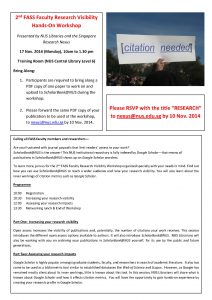Enhance Your Research Visibility! SRN and NUS Libraries present the 2nd FASS Faculty Research Visibility Hands-On Workshop
October 14, 2014
SRN regrets to inform you that the Research Visibility Workshop will be postponed as the response has been significantly lower than expected. We surmise that response will be considerably better sometime next semester when the new intake of faculty members come in. We will keep you informed once we confirm the new dates.
We sincerely apologize for the inconvenience. Please feel free to email drop us an email at nexus@nus.edu.sg if you have further queries.
Are you frustrated with journal paywalls that limit readers’ access to your work?
ScholarBank@NUS is the answer! This NUS institutional repository is fully indexed by Google Scholar—that means all publications in ScholarBank@NUS shows up on Google Scholar searches.
To learn more, join us for the 2nd FASS Faculty Research Visibility Workshop organized specially with your needs in mind. Find out how you can use ScholarBank@NUS to reach a wider audience and raise your research visibility. You will also learn hands-on about the inner workings of citation metrics such as Google Scholar.
Please RSVP with the title “RESEARCH” to nexus@nus.edu.sg by 10 Nov. 2014
Please also:
1. Bring along a PDF copy of one paper to upload to ScholarBank@NUS during the workshop.
2. Email the same PDF copy of your publication to be used at the workshop, to nexus@nus.edu.sg by 10 Nov 2014.
Programme
10:00 Registration
10:30 Increasing your research visibility
12:00 Assessing your research impacts
13:30 Networking lunch & End of Workshop
Part One: Increasing your research visibility
Open access increases the visibility of publications and, potentially, the number of citations your work receives. This session introduces the different open access options available to authors. It will also introduce ScholarBank@NUS. NUS Librarians will also be working with you on archiving your publications in ScholarBank@NUS yourself, for its use by the public and future generations.
Part Two: Assessing your research impacts
Google Scholar is highly popular amongst graduate students, faculty, and researchers in search of academic literature. It also has come to be used as a bibliometric tool similar to established databases like Web of Science and Scopus. However, as Google has remained mostly silent about its inner workings, little is known about this tool. In this session, NUS Librarians will share what is known about Google Scholar and how it affects citation metrics. You will have the opportunity to gain hands-on experience by creating your research profile in Google Scholar.

